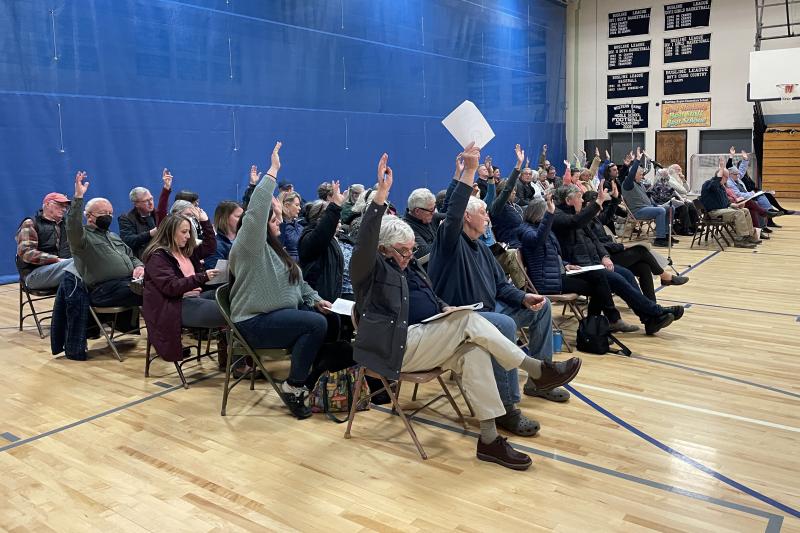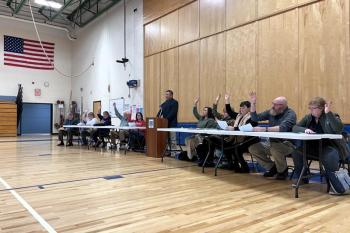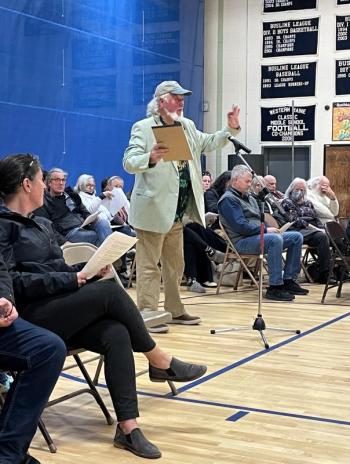Voters from the five towns in Alternative Organizational Structure (AOS) 98 approved next year’s $1,815,670 budget during the annual budget meeting April 9. Around 80 residents from Edgecomb, Georgetown, Southport, Boothbay and Boothbay Harbor filled the seats for the largest turnout in years, according to administrators.
The budget is a $114,590 (6.7%) increase from the 2024 fiscal year. It is split between $1,570,908 for system administration and $244,762 for special education. Each of the 17 warrant articles was approved with a wide majority of “yea” votes from residents, including school board members. However, a handful of taxpayers voted against a number of motions. And, on several occasions, a lone hand was raised for “nay.”
At the first opportunity for public comment on the budget, Boothbay Harbor resident Tom Perkins stood up to thank the crowd for attending and announce his objections. He highlighted what he sees as an unfair distribution of costs between towns and “exorbitant” salary and compensation packages for the superintendent and special education director jobs. The budget has allocated $138,000 and $106,502 salaries, and compensation packages up to $41,000, for the positions. Georgetown school board member Alaine Pinkham objected to Perkins’ comments on the grounds they did not specifically relate to the article being discussed.
“... Many of us will dare to admit the current system is broken and not financially sustainable for our towns. A partnership only works when it benefits all the partners, not when some are taking advantage of others.” Perkins said. “... I'm pretty sure we have an exciting window of opportunity right now for discussing something special to happen with other area towns. But right now, this organization seems to be standing in the way of that progress. So, I'll be voting ‘no’ on all the articles tonight ...”
Other residents who spoke questioned the viability of a regionalized school. Boothbay Harbor resident Michael Mayhew commented later in the meeting on the cost of transportation. He said Kennebunk will be offering over $30 an hour for bus drivers, according to WGME, which ties into costs many Boothbay region residents may not think about when considering regionalized school options.
“I think there's a lot of talk about us trying to have a consolidated school not where this is, and that's going to require a transportation increase,” he said. “I just think a lot of people don't think about the safety as well as the monetary issues associated with trying to find a bunch of us drivers.”
Ruth Macy, a former Boothbay Harbor school board member, spoke up at the vote for the budget summary article. She thanked the board for supporting special education and school administration and raised concerns about regionalization.
“I know how hard it is to pare this down, and I know you've done your best to make our tax bills low,” she said. “And thank you for being realistic about the fact that no other town has agreed to give up their school choice. And that, at this time, even if we were to consolidate with some imaginary town that has not agreed to give up their school choice, that we're still doing the work of funding and administrating the schools that exist for the students who need to go here next year.”
One resident asked for clarification on warrant articles and how costs are allocated. According to the budget, member schools share $783,666 of costs based on the AOS 98 cost-sharing formula. Boothbay-Boothbay Harbor Community School District (CSD) is responsible for $463,774, Edgecomb, $158,301; Georgetown, $126,405; and Southport, $35,186. Allocations for the CSD and Georgetown schools increased 2.8% and 4.1% from the 2024 fiscal year, respectively. Edgecomb and Southport allocations decreased 14.4% and 16.8%, respectively.
To fund the remainder of the budget, voters approved the use of $50,000 from the fund balance and $982,004 from charges for services to the education service center.
In addition, voters approved the creation of a $40,000 account, taken from the unassigned fund balance, to help cover costs related to transitioning to a new special education director. The current director plans to resign at the end of the school year, as reported in the Register.


































